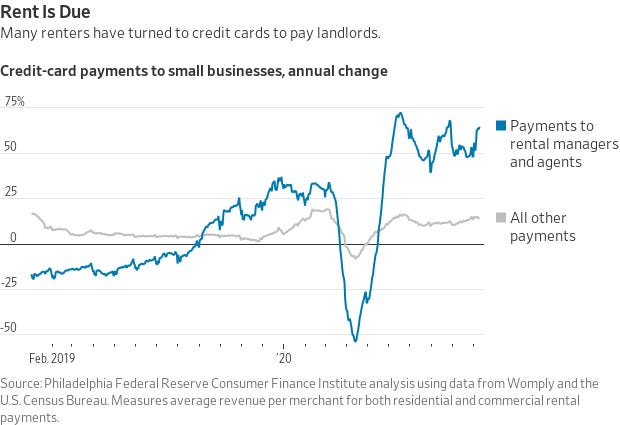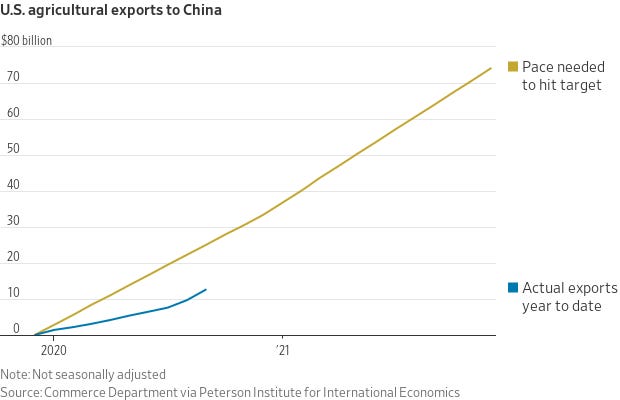Welcome to the Weekend Reccs. Today’s world is curious and cacophonous. This newsletter delivers an eclectic sample of some of the best things to read, watch, and ponder over your weekend. There’s a lot of economics and politics, but there is also so much more.
If you were forwarded this from a friend be sure to subscribe to never miss an issue. If you aren’t sure this is for you, keep reading—you’ll have another opportunity at the end!
Happy Sunday evening everyone,
I hope you won’t mind this later-than-usual issue of the Reccs. It has been quite a week for us all. A short issue below.
The Weekend Reccs
Revenge of the Nates: Look folks, there are A LOT of takes flying around right now about what to make of this election. It will take some time to separate the wheat from the chaff in terms of what we can learn from the outcome. What seems clear is:
Biden ran ahead of most all Democratic candidates for Senate. This makes it unlikely that “Shy Trump voters” exist, and more likely that polls had bad models for GOP turnout, especially among less educated voters. Further, this pattern highlights either (1) Biden’s particular strength as a candidate this cycle, or (2) voters’ desire to put a “check” on a Democratic executive via split control of government.
The models were mostly right. If you were to take FiveThirtyEight’s model output and make it a narrative it was essentially, “Biden has a robust enough map to withstand a sizable polling error, but Trump still has a chance.” What happened was that there was a sizable polling error, and Trump had a chance, but he couldn’t overcome the robustness of Biden’s map. And for the other Nate, he can pride himself on pointing out a trend in 2019 that surprised many pundits: high turnout does not always favor Democrats (s/o Caroline).
The longer Trump pursues seemingly baseless claims of fraud, the better for Democrats. As we enter these runoffs, Perdue and Loeffler will have an impossible choice: back Trump and lose moderate GOP voters who won’t play along with his lawsuits or accept Biden and lose the most energetic part of their base. If Warnock and Ossoff’s teams are smart they’ll laser in on this issue.
The major outlets made an objectionable decision in delaying the announcement. It was clear much earlier that Trump had lost due to the composition of uncounted ballots, but they waited until Biden clearly took the lead. Maybe this decision allowed for clearer communication, but I found it cowardly and reckless. The longer the race went uncalled, the longer the Trump team had to build a narrative around “found” ballots and claim their illegitimate victory. We knew Wednesday evening that Biden had the votes outstanding to clinch the Electoral College. By pretending that we needed to wait, the media helped further delegitimize the election. Is it hard to explain to someone the statistical methods used to determine what share of outstanding ballots are for each candidate? Maybe! But explaining the complicated world is their whole reason for being.
The election conveyed one of the iron laws of systems design: there is an inherent tradeoff between robustness and efficiency. We could run our elections in a highly efficient manner by allowing the federal government to specialize in administration of elections. This would streamline costs and speed up counting, but it would leave the system vulnerable to even small disruptions or interference. Instead, by having each of our ~3000 counties administer separate elections with separate governing electoral bodies, we have a slow, costly process that is incredibly robust to any sort of manipulation. Even if Trump’s claims of fraud were true (no hard evidence has been provided to support any of the claims), they would be localized to a particular county or handful of counties. You cannot coordinate widespread fraud across so many independent actors. Even in practically the only recent case of election fraud the GOP operative who was tampering with ballots only was able to impact one county. The result of our decentralized design is that the Trump teams’ claims are so narrow that they would fail to overturn most of these vote margins even if they had standing. And thus, not only are the results robust to fraud directly, they’re also robust to claims of fraud that seek to delegitimize them.
So, sure, we all would have liked a faster count, but we can thank the slow counting for being able to trust the result.
An Uneasy Union: Bond County and several others asked voters this year if they wished to split Illinois into two states. It feels like a joke at this point that in recent years legislators from downstate consistently put forward plans to make Chicago its own state.
Less than 100 years ago, though, the roles were reversed. For 15 years, the legislators in Springfield refused to redistrict the state in response to the 1910 and 1920 censuses. These censuses reported an ascendant Chicago, and the downstaters, recognizing their tenuous grip on the state legislature, refused to provide Chicago the representation that the population deserved. After waiting 15 years for its due representation, Cook County put forth a proposition for statehood. The redistricting issues were later resolved.
Again in 1981 Cook County sought statehood, but this time it was more political theatre than a true ambition. The linked website has some other great documents, too, such as this one showing a 1909 court battle to preserve Chicago’s now-iconic lakefront park.
Trump is Raising Your Taxes: Stiglitz wrote a good piece about the Trump Tax Plan’s (TCJA’s) “hidden” tax hikes that the GOP timed for 2021. Stiglitz is a little too fist-wavy in my opinion, but he draws attention to an important aspect of the TCJA. What you need to know is that tax cuts are required to conform to certain Congressional requirements about deficits past a 10-year grace period. In order to conform to these requirements, the TCJA ramped up taxes after Trump’s first 4 years in office, under the assumption that either (a) Trump wins reelection and can use the looming higher taxes as a bargaining chip for more tax cuts, or (b) Trump loses reelection and it looks like Democrats are raising your taxes. The tax raises for the middle class is already on the books thanks to the Trump tax bill, it is just a matter of time before they go into effect. In order to keep tax rates steady for the middle class, Biden will have to find a way to pass meaningful tax reform.
Quick Links:
Massachusetts passed an interesting law about data rights for automobile owners
Photos of the ISS at 20 years old
Election maps are usually done poorly, here are some alternatives
How Falun Gong created a right-wing media powerhouse (s/o Aren Rendell)
Lagniappe
A few weeks ago I tore through Gillian Flynn’s Sharp Objects (CW) and Dark Places, both on audiobook. Both are worthwhile reads that will give you a much-deserved break from the election.
Graph(s) of the week
[WSJ] This is what happens when you do not support state finances during a recession.
[WSJ] This is really scary! We’ve talked a lot in the Reccs about the importance of supporting renters and about the looming foreclosure crisis. Putting rent on your credit card is not good news.
[Economist] Bankers charge more when their party is not in power. This makes sense if you believe that partisanship is high and that partisans do not trust the other side to manage the economy well.
[WSJ] Even with the incredible gains we have had in the job market, we’ve still lost more jobs than any recession, ever. We will need much more stimulus. I suspect that if Democrats lose the Senate McConnell will suddenly remember that he is a fiscal conservative and will block any relief proposed by the Biden administration. All eyes on Georgia.
[WSJ] One of Donald Trump’s legacies will be his failed trade war with China. What is yet to be seen is if Biden will be able to do a better job in reigning them in and putting forward a deal that actually works.
And of course, in closing:
Your friend,
Harrison










“Stiglitz is a little too fist wavy” that made me chuckle because that’s exactly what I thought when I read that piece as well.